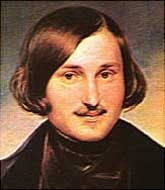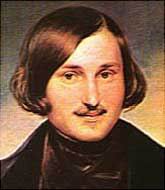Nikolai Gogol
|
|
Nikolai Vasilevich Gogol (Russian: Никола́й Васи́льевич Го́голь) (March 31, 1809 - March 4, 1852) was a Ukrainian-born Russian writer. Although many of his works were influenced by his Ukrainian heritage and upbringing, he wrote in Russian and his works belong to the tradition of Russian literature. Perhaps his best known work is Dead Souls, seen by many as the first "modern" Russian novel.
Gogol was born in Sorochintsi of Poltava Guberniya (now Ukraine) to the family of Ukrainian (or rather Ruthenian) small-time nobility (dvoryanstvo). Some of his ancestors associated themselves with Polish Szlachta (probably not by ethnicity but culturally, due to the continued polonization of Ruthenian upper class) and his grand-father Afanasiy Gogol wrote in census papers that "his ancestors, of the family-name Gogol, are of the Polish nation". However, his great-grandfather, Jan Gogol, after studying in Kyiv-Mohyla Academy, a deeply Ukrainian, or Ruthenian, and Orthodox Christian educational institution, moved to the Muscovy leaning Left-bank Ukraine (Malorossia) and settled in Poltava region, originating the Gogol-Janovsky family line. Gogol himself did not use the second part of his name considering it an "artificial Polish addition". Gogol's father died when the boy was 15 years old. The deep religiosity of his mother have likely influenced Gogol's world view as well as the time he spent in the mixed surrounding of local small-time nobility and everyday village life.
He moved to Saint Petersburg in 1828. In 1831, he met Aleksandr Pushkin, who supported him as a writer and became his friend. He later taught history at Saint Petersburg University from 1834 to 1835. He went on to write a number of short stories set in Saint Petersburg, including "Nevsky Prospekt", the Diary of a Madman, "The Overcoat", and "The Nose" (which was later turned into an opera by Dmitri Shostakovich). However, it was his farce The Inspector General, produced in 1836, which first drew him to the public's attention as a writer. Its satirical tone, which it shares with much of his other work, caused some controversy, and Gogol fled to Rome.
Gogol spent almost 5 years living abroad in Germany and Italy. It was in this period that he wrote Dead Souls, with the first part published in 1842. (Gogol asked Pushkin for ideas about essential Russian stories; in response, Pushkin suggested the basic idea of Dead Souls.) In 1848 Gogol who became deeply influenced by Orthodox Christianity made a pilgrimage to Jerusalem. After his return, under the influence of the priest, Father Konstantinovskii, he renounced literature in favour of religion. He burnt what he had written of the second part of Dead Souls ten days before he died on March 4, 1852 in Moscow. Some fragments of the work survived and have been published.
He is interred in the Novodevichy Cemetery, Moscow, Russia. The photo is of the sculpted bust marking his grave.
Interpretation
Gogol's literary life and works show convolutions of struggle between the Westernizer and Slavophile urges in Russian culture. Living in post-Napoleonic Russia, with recent serf emancipation, and liberal discontent against Czarist rule, reformers interpreted Gogol stories as validation. This is because some of Gogol's stories satirized situations particular to Russian society. Indeed, Gogol was motivated as a reformer in his own mind, but not necessarily as defined by the liberals of the time. Toward the end of his life, liberals saw him as a religious fanatic, strangely reactionary, and increasingly pathetic.
An urge to reform Russia impelled Dead Souls; but whether moral or political seems unclear at first. Part one of that book shows the errors of the protagonist, part two shows the corrections. Arguably, Gogol is more successful showing the errors than the corrections, perhaps because errors and immorality are more fun and interesting to write about, than to preach and show good by example.
Gogol's desire for the moral reformation of Russia became increasingly loud and unliberal, leading to his publication of selected fanatical letters. His former liberal admirers looked upon this publication with horror and dismay. It may be the contradictions and failures of Gogol's embodiment of both "Westernizer" and "Slavophile" urges that lead him to burn his draft of part two of Dead Souls, and for his health to fatally decline.
Gogol wrote in the literary tradition of E.T.A. Hoffmann, often involving an element of the fantastic. In addition, Gogol's works are often outrageously funny. The mix of humor, social realism, the fantastic, and unusual prose forms are what readers love about his work.
Gogol wrote in a time of political censorship. The use of the fantastic is, like Aesophic storytelling, one way to circumvent the censor, as placing the supernatural into a realistic setting softens anything that offends the regime by making it also seem "not real". Some of the best Soviet writers also used the fantastic for similar reasons.
Gogol had a huge and enduring impact on Russian literature (Fyodor Dostoevsky famously claimed that 'we all [future generations of Russian novelists]came out from under his Overcoat'). In the 1920s, a group of Russian Writers consciously built on this thread, created the Seripian Brethren, naming the group after a character in a Hoffmann story. Writers as Yevgeny Zamyatin, Bulgakov and Abram Tertz (Siniavsky) also consciously followed this tradition.
External links
- Template:Gutenberg author
- Full collection of Nikolai Gogol works (http://az.lib.ru/editors/g/gogolx_n_w/)
- Some works by Nikolai Gogol in the original Russian (http://ilibrary.ru/author/gogol/)
- Some photos of places and statues that are reminiscent of Gogol and his work (http://www.acad.carleton.edu/curricular/RUSS/Moscow/2001PhotoAlbum/StPetersburg/Dostoevsky_GogolSights/)
- Nikolai Gogol's entry in the encyclopedia of gay, lesbian, bisexual, transgender, & queer culture (http://www.glbtq.com/literature/gogol_n.html)
bg:Николай Гогол cs:Nikolaj Vasilijevič Gogol de:Nikolai Wassiljewitsch Gogol es:Nikolái Gógol fr:Nicolas Vassiliévitch Gogol ja:ニコライ・ゴーゴリ nl:Nikolaj Gogol pl:Mikołaj Gogol ru:Гоголь, Николай Васильевич sr:Николај Васиљевич Гогољ fi:Nikolai Gogol sv:Nikolaj Gogol


